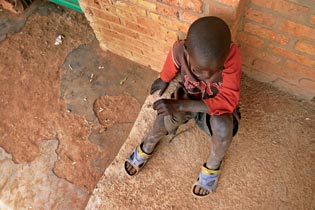 More people are enslaved today than ever before-but most people don’t know about it
More people are enslaved today than ever before-but most people don’t know about it
My husband and I both had part-time jobs when we were teenagers, although my parents didn’t like it and preferred that I spend my time studying. I took advantage of the opportunity to work, but study … hmmm, I don’t think so.
My older children have all had part-time jobs, but I’ve also been careful to ensure they made time for their school work. My two younger boys, when they’re old enough, will have the same opportunity to earn a bit of cash for those little extras we can’t afford to provide. But let’s get this straight, they’ll be working for extras-not necessities.
In many parts of the world, if the children of the family, even young ones, don’t pitch in, the family doesn’t survive. But it goes even deeper than that.
I read an article about modern-day slavery in Sojourners, a Christian magazine concerned with social justice. I’ve had a subscription for more than a year and admit I’m regularly challenged to rethink how I feel about things that take place on the international political scene.
Did you know that right now, as you’re reading this, there are more than 27 million slaves around the world? When I read that statistic, I was shocked. I started to do some research and discovered, to my horror, that there are more than 250 million child labourers working in various countries, many of them bonded slaves-that is, they are taken to work in factories to pay off a family debt. I read about a 12-year-old boy who has been working in a rug factory in Pakistan since he was four. The family’s debt has actually increased over the years because the boy’s family is “fined†when he makes mistakes.
In sheer numbers alone, there are more slaves today than there were seized from Africa during the 400 years of the trans-Atlantic slave trade. That’s absolutely shocking, and I admit I’m not sure what to do with this information. How should I live, knowing what I know now? What do I tell my kids about this slavery and the kinds of things that happen to these children? How much should I protect them from this horrible evil in the world? How can I make it seem real to them when they live among such wealth?
I could change my buying habits. I could stop supporting companies that abuse workers, especially women and children. But that would prove difficult. Almost everything is made in another country. Even in Canada, much of the food that we eat comes from the U.S., where they rely on workers from Mexico and South America to come and work in appalling conditions to harvest their products. When I go to the big-box stores, almost everything is brought in from China. Well, China is different right? They are making laws there to address these issues, right? I decided to check it out.
According to a report by the U.S.-based China Labour Watch, the Bratz dolls that are so popular now among young girls are made in a factory in China. In Canadian terms, the workers earn the equivalent of 60 cents per hour. Many work up to 80 hours each week just to make what the average person makes in China-an annual salary of about $2,200 US.
I wanted to know more, so I looked into the cost of living in China. It’s not cheap. One Starbucks cappuccino costs the equivalent of $3.75 Cdn. A single adult movie ticket costs about $4.25. A typical factory worker has to work at least 100 hours to have a meal in a cheap restaurant, never mind pay rent, buy food and clothing and cover medical costs.
Now well armed with information, I’m emboldened to continue my research. I certainly will boycott products that are the result of slave labour, including certain types of dolls made in China. But what about that Persian carpet I really like? Was it made by bonded workers? What about my clothes? Where are they made? Who is making them?
How can I do anything about this? In my own little corner of this global village, how can I possibly make a difference? I’m not sure. But I’m going to get involved. I’m going to learn as much as I can. I’m going to find a way to let my children know that God wants us to do something. I’m going to find a way to get our family involved in this tragic issue. I’m going to find a way for us to make a difference. And to start, I’m going to pray.
For more information on human trafficking, read Not for Sale: The Return of the Global Slave Trade-and How We Can Fight It (David Batstone, Harper Press, 2007) or visit www.notforsalecampaign.org
by Captain Kathie Chiu
Corps Officer and Executive Director of The Caring Place Ministries, Mountain View Community Church, Maple Ridge, B.C.
Reprinted from Salvationist May 2007